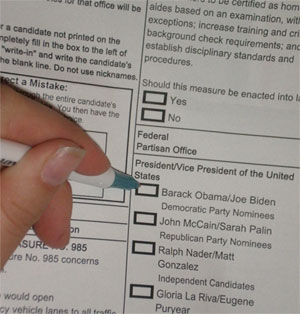 |
| A dual citizen, Annie Burns-Pieper gets ready to fill in her absentee ballot. |
On Wednesday, the world woke up to find itself a changed place. After what felt like one of the longest election campaigns ever, Americans elected their 44th president, Barack Obama. Already an icon, Obama will be the first African-American president of the United States after his official swearing in January.
His landslide victory is historic not only because of ethnicity, but because of the record number of ethnic minorities and youth who flooded into the polls, mobilized by this energetic and inspiring leader. The world was captivated on Tuesday night as Obama stepped to the podium and promised change, something we all have long been waiting for.
The Dalhousie community was no exception. The lack of seating at an election party held at the Grad House indicated Canadians and Americans at Dal were willing witnesses to history. Students watched from their home televisions, checked in on the Internet from the library and texted each other quickly after the Obama victory was declared around midnight (Atlantic time).
I got the opportunity to speak to students about the results of this election and what they believed it would mean for America and the world. I focused on Dalhousie’s American student community since, after all, he is their president. The students I spoke to overwhelmingly supported Obama and were thrilled, even elated, about the results. At the same time, they were concerned about the massive challenges facing the president-elect, such as the wars in Iraq and Afghanistan, the financial crisis, the political division in the country and health care, to name a few.
“In cleaning up the mess left by Bush, Obama will have to make some hard decisions,” says David Blanchard, a science student from Maine. He added he believes this leader has the strength and courage to make the changes needed.
All students surveyed were curious as to what the next four years have in store, but predicted more political involvement by average Americans, empowerment of ethnic minorities and changes in health care and education in the United States. Now we have to wait and see if Barack Obama and his democratic party can possibly live up to the expectations of the world and America.
Will we indeed see change? In his acceptance speech, Obama recognized the challenges he faces as he moves into the presidency— “two wars, a planet in peril and the worst financial crisis in a century.” But regardless of what happens in the next four years, the changes have begun. The Obama victory signals a significant shift in U.S. race relations.
Annie Burns-Pieper is a fourth year International Development student from British Columbia with dual citizenship who sent in her absentee ballot for Obama on the day of the Canadian election.
